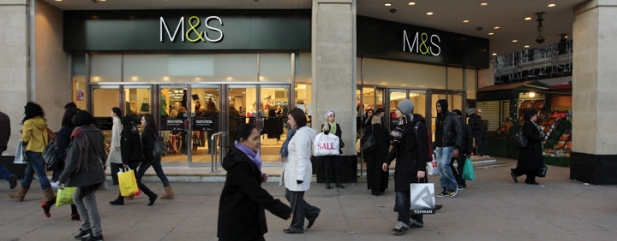Archived article
Please note that tax, investment, pension and ISA rules can change and the information and any views contained in this article may now be inaccurate.
Should M&S and Next consider a merger of equals?

High street retailers Marks & Spencer (MKS) and Next (NXT) are running hard just to stand still amid difficult market conditions. Is it time for a more drastic form of action? One analyst has suggested there is merit for the two companies to merge.
Whitman Howard retail analyst Tony Shiret says some of the UK’s large non-food retailers are struggling with too many stores to service customers and pressure on selling prices given the online channel provides greater price visibility to customers (and rival businesses).
‘A long term cost cutting led scenario can only go so far and this is why we think that more drastic measures will be considered. Effectively in contemplating a Next/M&S link-up we are positing consolidation of the sort seen in some other under-pressure segments – electricals/DIY.’
Shiret concedes a merger is unlikely near-term, although he believes such a deal would make sense for strategic reasons other than cost cutting.
‘We point to the combined market share of the two – say 17% pre-closures and maybe 15% post – which would give enhanced buying and pricing power; and the wider segmentation that the combination would allow of the UK clothing market.’
The analyst thinks it could be another three to four years before Marks & Spencer and Next would be willing to engage in a consolidation debate.
Shiret says he first considered the merits of a merger between the two companies eight or nine years ago. At the time, he says he had no idea how large online retail was going to be. ‘Even allowing for the more dominant combined position would that have increased the business capability in this more difficult market or made the enlarged company a bigger target for disrupters?’
So why has he revisited this tie-up concept? He believes the arguments in favour of scale are more pertinent now, adding: ‘A larger strategy re-set would allow both businesses to get on to the front foot and make the capacity reductions necessary rather than the zero currently envisaged by Next and the and the banker-driven way-out-in-the-future 10% net non-food space reduction announced by M&S.’
Elsewhere in the retail sector, the analyst has debated the takeover appeal of retailer Dixons Carphone (DC.). He says the Carphone part of the business is beginning to look like a ‘poison pill’ given the low transparency of its faltering sales and profit streams, plus its significant physical store capacity.
Shiret suggests one exit route for shareholders would be a bid by Amazon should it choose to use Dixons as the electrical retailing equivalent of its Whole Foods supermarket acquisition.
Investors should note the analyst’s comments are fantasy M&A at present, rather than suggestions of solid deals.
Important information:
These articles are provided by Shares magazine which is published by AJ Bell Media, a part of AJ Bell. Shares is not written by AJ Bell.
Shares is provided for your general information and use and is not a personal recommendation to invest. It is not intended to be relied upon by you in making or not making any investment decisions. The investments referred to in these articles will not be suitable for all investors. If in doubt please seek appropriate independent financial advice.
Investors acting on the information in these articles do so at their own risk and AJ Bell Media and its staff do not accept liability for losses suffered by investors as a result of their investment decisions.
Issue contents
Big News
- Bakkavor’s renewed appetite for IPO
- UK construction in recession
- Can Workspace fight off WeWork’s competitive threat?
- Worrying number of profit warnings in 2017
- IQE cash call gets huge backing
- CityFibre strikes ultra-fast fibre deal with Vodafone
- Insurer opens doors to retail investors with £600m IPO
- Brighter prospects for drugs giant AstraZeneca

 magazine
magazine








